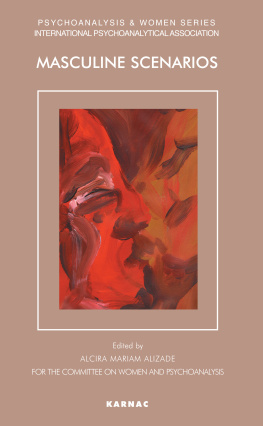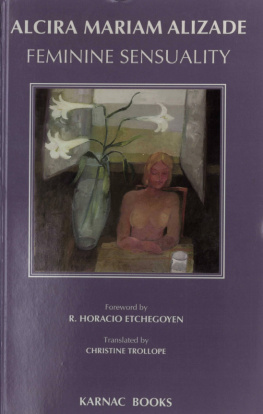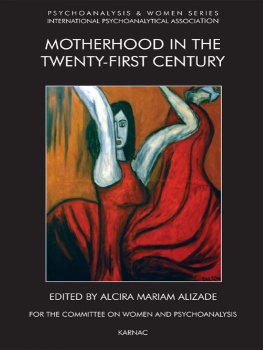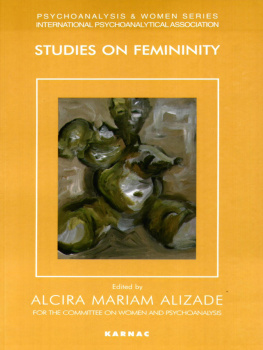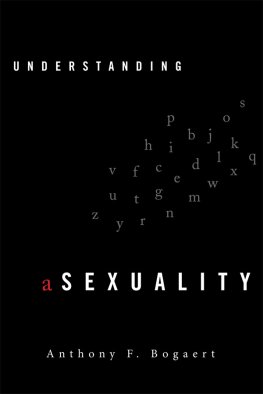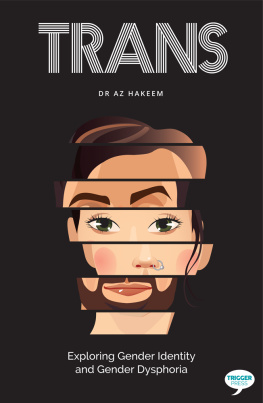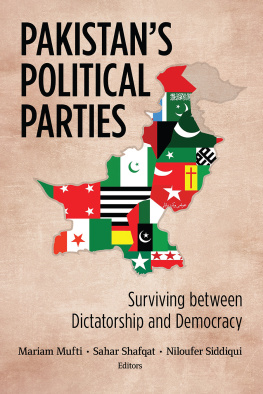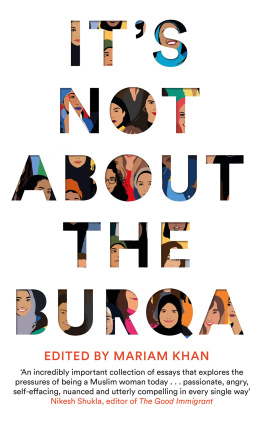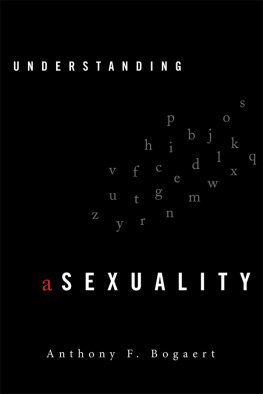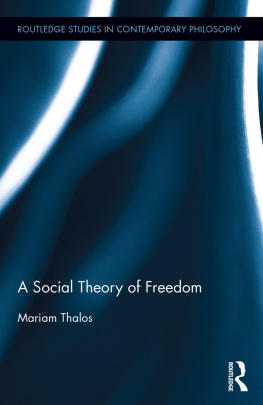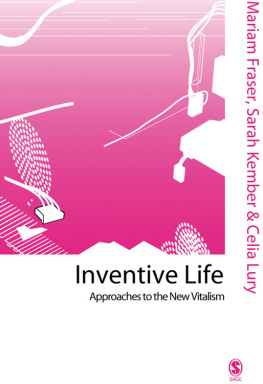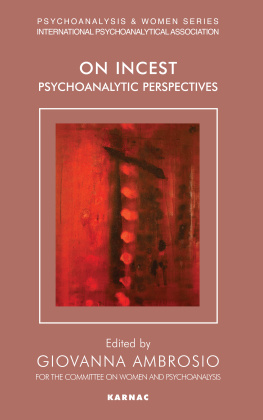First published in 2003 by
Karnac Books Ltd.
118 Finchley Road, NW3 5HT
Copyright 2003 International Psychoanalytical Association
Copyright 2003 Arrangement, Foreword and Chapter 2 by Alcira Mariam Alizade
Chapter 1 2003 Colette Chiland
Chapter 3 2003 Jacqueline Amati Mehler
Chapter 4 2003 Jaime M. Lutenberg
Chapter 5 2003 Martin Stephen Frommer
Chapter 6 2003 Jorge Kantor
Chapter 7 2003 Juan-David Nasio
Chapter 8 2003 Juan-Guillermo Figueroa-Perea
Chapter 9 2003 Leticia Glocer Fiorini and Agueda Gimenez de Vainer
Chapter 10 2003 John Munder Ross
Chapter 11 2003 Ruth F. Lax
The rights of all the above persons to be identified as the authors of this work have been asserted in accordance with 77 and 78 of the Copyright Design and Patents Act 1988.
All rights reserved. No part of this publication may be reproduced, stored in a retrieval system, or transmitted, in any form or by any means, electronic, mechanical, photocopying, recording, or otherwise, without the prior written permission of the publisher.
British Library Cataloguing in Publication Data
A C.I.P. for this book is available from the British Library
ISBN: 9781855759626
10 9 8 7 6 5 4 3 2 1
Edited, designed, and produced by The Studio Publishing Services Ltd, Exeter EX4 8JN
www.karnacbooks.com
FOREWORD
COWAP, the Committee on Women and Psychoanalysis of the International Psychoanalytical Association, is both pleased and proud to present the third volume of this series of books, which provide a forum for discussion of issues involving sexuality, sexual identity, and gender constructs in a cross-cultural and international context.
The remit of the Committee is to investigate sexuality, interactions, and relationships between men and women. With this in mind, Masculine Scenarios aims to offer the reader a wide range of topics with their implications for the world of psychoanalysis. Masculine Scenarios discusses different issues involving object relations and their vicissitudes as regards the psychic world of men and male sexuality in general.
This book is intended to be open-minded and free-ranging in spirit. In putting forward their ideas, the authors hope that they will lead to fresh thinking and new hypotheses that stimulate the cross-cultural interplay of psychoanalysis and psychoanalytic ideas.
The contributors were selected on a basis that combined both chance and known professional skill, with the idea of theoretical pluralism uppermost in our minds, even though we realized that this would probably result in controversy.
The reader will find not only papers from different essentialist, constructivist, and culture-based standpoints, but will also note the existence of theoretical and clinical intersections where psychoanalysis borders on closely-related disciplines, such as philosophy, sociology, history, ethology, etc.
The biology that Nature bestows on each of us at birth, in its innocence and originality, provides the stage where human scenarios unfold. It is on this basis that the development of somatic, psychic, and socio-cultural integration is analyzed on various levels.
The body, that strange governor of our fate, gives expression to the voices inhabiting it. The inner discourse is that of our first significant others, with their trans-generational mandates and identificatory patterns. They speak to us through traumatic experiences and sexual feelings.
Historically, sexuality, as viewed by psychoanalysis, is wide-ranging and encompasses heterogeneous forms that involve subjectivity, scenarios recorded in the psychic flesh, and inevitable psycho-physical and cultural events.
In this series, classical areas of psychoanalysis are conjugated with postmodern questions and with new hypotheses to form a kind of heterogeneous, pluralistic spectrum defined to some extent by time and influenced by social factors that participate in the genesis and development of psychodynamics. The controversial concept of gender calls into question our established theories on sexuality and forces us to listen with an open mind to issues involving sexual identity and choice of sexual object.
This volume will enable the reader to venture on a stimulating journey into psychoanalytic terminology, cultural definitions, certainties, doubts, and hegemonies of all kinds. They oblige us to think and to think again about the complexity of sexuality in the light of psychoanalysis. Human identity, sexual identity, primary and secondary identification, object choice, narcissismall of these lie on a continuum with homosexuality, transsexualism, transvestism, heterosexuality, and asexuality. Concepts on sexuality and gender are outlined anew in an interplay of theoretical and clinical networks, with the aim of increasing the efficiency of analytic praxis freed from prejudice and monolithic convention.
The hope of the Committee is that these papers will encourage future volumes with the aim of opening up further pathways into psychoanalytic exploration.
Alcira Mariam Alizade
Chairperson,
Committee on Women and Psychoanalysis of the
International Psychoanalytical Association.
CONTRIBUTORS
Alcira Mariam Alizade, M.D., is a psychiatrist and training analyst of the Argentine Psychoanalytic Association, Latin American co-chair of the IPA Committee on Women and Psychoanalysis (1998-2001) and current chair of the Committee on Women and Psychoanalysis of the International Psychoanalytical Association (COWAP). She is the author of Feminine Sensuality (Karnac Books, 1992); Near Death: Clinical Psychoanalytical Studies (1995); Time for Women (1996); The Lone Woman (1999); Positivity in Psychoanalysis (2002).
Jacqueline Amati Mehler trained in Adult and Child Psychiatry at Harvard University and is now a full-time practicing psychoanalyst. She is a training analyst and former President of the Italian Psychoanalytical Association (AlPsi) and founder of the Italian Journal Psicoanalisi. In 1988 she was a recipient of the Mary Sigourney Honorary Award. She is author of numerous clinical and theoretical publications, including a book, The Babel of the Unconscious, written with S. Argentieri and J. Canestri.
Colette Chiland is Emeritus Professor of Clinical Psychology in the Ren Descartes University of Paris, France (Paris V). She is currently a psychiatrist at the Alfred Binet Centre, Paris and a member of the Paris Psychoanalytical Society (S.P.P.).
Juan-Guillermo Figueroa-Perea, M.D., is a professor and researcher at the Centra de Estudios Demograficos y de Desarrollo Urbano of El Colegio de Mexico. He has over twenty years experience working in areas related to reproductive behaviour and health, and has been coordinating seminars regarding Ethics and reproductive health, Womens reproductive rights and Sexuality, reproduction and health within the male perspective in Mexico. He is also undertaking joint projects with NGOs on health and reproductive rights (of both women and men).
Martin Stephen Frommer, Ph.D., is a faculty member and supervisor in the psychoanalytic training program at the Institute for Contemporary Psychotherapy in New York City where he teaches in the areas of gender and sexuality. His articles have appeared in the journals Psychoanalytic Dialogues, Studies in Gender and Sexuality, Journal of the American Psychoanalytic Association and the Journal of Gay and Lesbian Psychotherapy, where he is a member of the Editorial Board. He maintains a private practice in Manhattan.
gueda Gimnez de Vainer, M.D., is a psychoanalyst. He is a full member, training analyst, and professor of the Argentine Psychoanalytic Association and a professor in the Department of Mental Health of the University of Buenos Aires.

